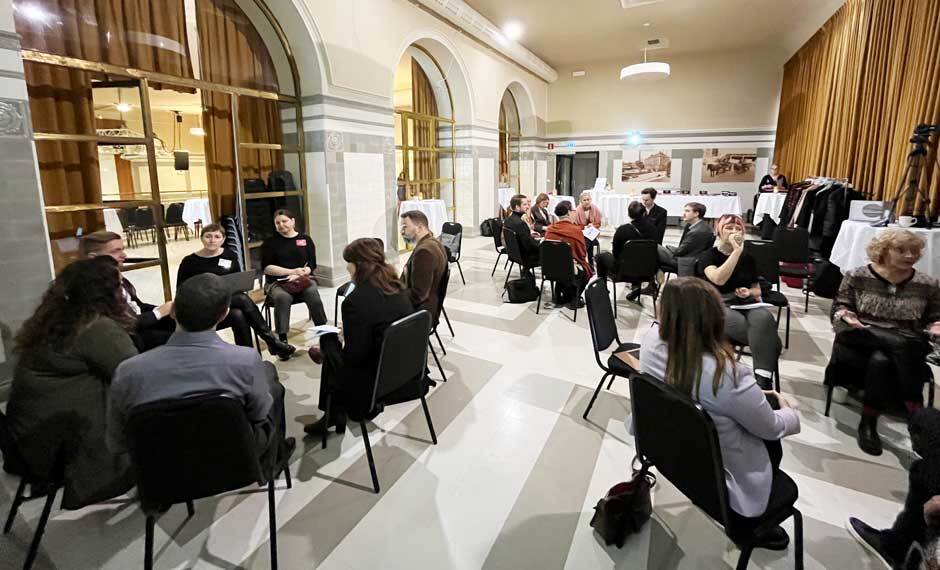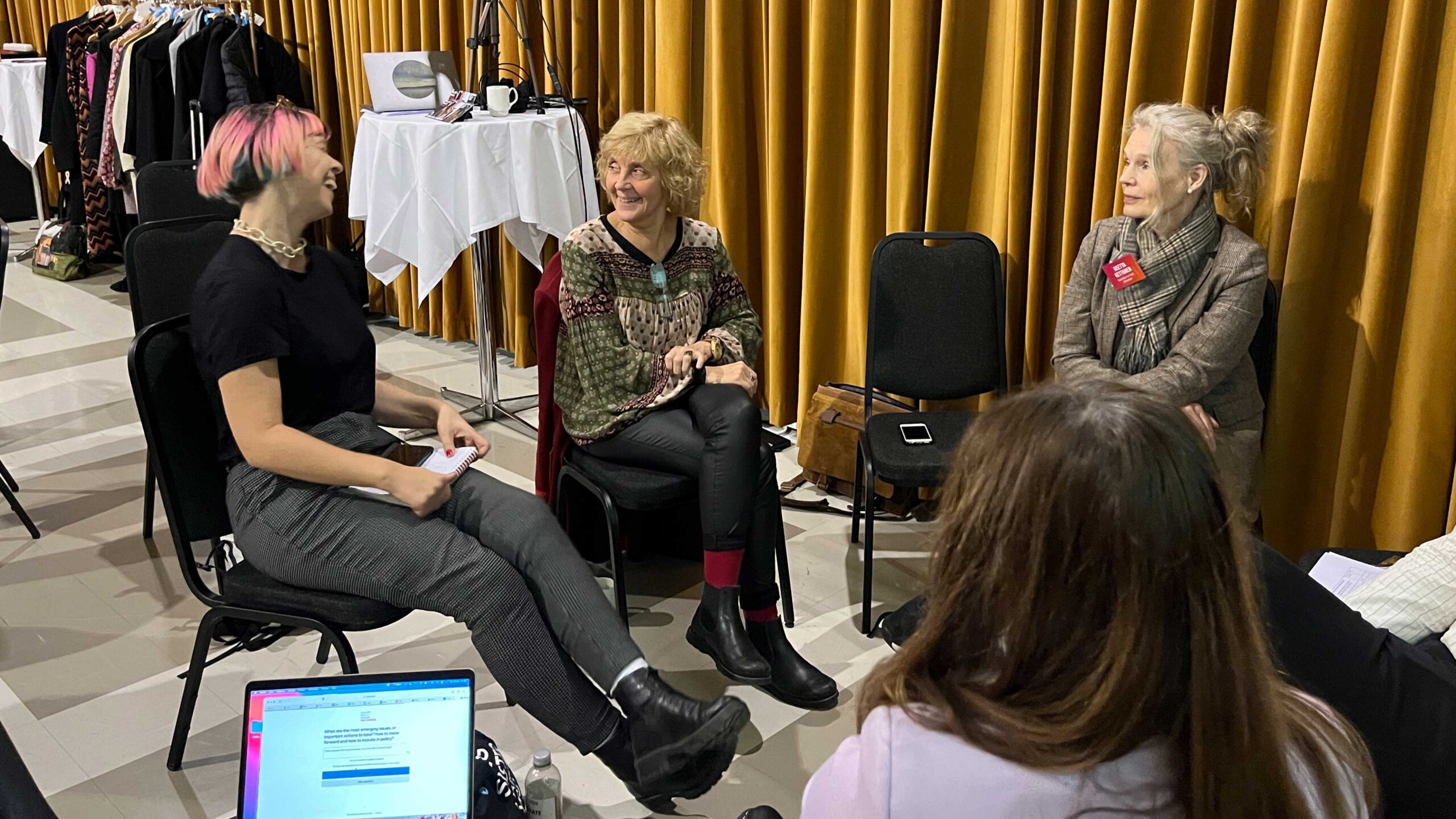New policy initiatives, national strategies for science communication and recent science engagement activities.These were the themes discussed when around 30 members of the Nordic Baltic science communication and science engagement community met in Stockholm on 14-15 November, hosted by the Falling Walls Engage Hub Sweden.
This was the first in-person gathering since the pandemic started. Covid-19 certainly paved the way for new ways of communicating science, but at the same time it also opened up for a multitude of ways and channels to engage with society. This shift has put pressure on organisations to reconsider their strategies for science communication and engagement.
The two day event gave a broad overview of how the Nordic Baltic scicomm landscape has developed, from national policy initiatives to the creation of new arenas and activities. The meeting also presented an opportunity to exchange and elaborate ideas on future collaborations, and joint policy actions within the Hub Sweden Community and across the globe.
Spotlight on national engagement initiatives
During 2023, a new scicomm organisation will see the light in Denmark. Peter Hyldgård from the Royal Danish Academy of Sciences and Letters presented the new organisation that is being set up at Formidlingsakademiet. During the next two years the organisation will put the spotlight on citizen engagement to ensure that Danish citizens have access to the best possible knowledge to make informed decisions and form attitudes. The goal is to empower and strengthen citizens’ participation in democratic processes with a special focus on underrepresented groups.
Another way of making science accessible is to ensure that those conducting science have the necessary tools to communicate their research. Therefore, in Sweden the Swedish Research Council together with Örebro University has elaborated a pilot training course in science communication for doctoral students within the university curriculum. This initiative has proven to bridge the gap between communication officers and researchers at the university. It has also facilitated knowledge exchange and mutual learning between the two groups and inspired other Swedish universities.
In Finland, several steps have already been taken to open up the research system. At Hanaholmen Academy, Janne Wikström is focusing on building and enhancing citizens’ science capital. People’s perceptions, knowledge and attitudes to science are mainly dependent on how much science they are being exposed to in their daily life. In January, an open forward-looking Nordic Baltic seminar on “Science Capital, Citizens and Society – Benefits and Opportunities”, will take place. It will seek to develop a common understanding and future strategies on citizen engagement in science.
It’s full STEAM ahead for science engagement in Iceland. Collaboration, co-creation and dialogue have become a new norm, says Gudrun Bachmann, University of Iceland. In the coming SAGA science centre, the university will bring together higher education and society, creating a hub of formal and informal learning in a cross-disciplinary and co-creative manner.
Bottom-up approaches to science engagement also need policies and strategies to flourish and become sustainable. In 2020 The Estonian Research Council launched a science communication strategy called “Estonia knows” which will run to 2035. Annely Allik, Head of Communication, presented their strategy in which scicomm is an integral part of research and effective stakeholder collaboration supports science communication activities, with the goal of creating a science-based society. Over the past 10 years, they have been running a very popular TV contest, Rakett69 (Rocket 69), which aims to show that STEM is fun and exciting. Over the years it has inspired students, influenced teaching methods and popularised STEM careers in Estonia.
Policy initiatives across the globe
There is an ongoing international trend of statements and recommendations on science communication and science engagement. Several initiatives to enhance, encourage and enable science communication and science engagement practices on a global scale have been launched during the last few years.
To date there have been only a few science-related UN Years, but 2022 has been designated the Year of Basic Sciences for Sustainable Development. As a result, Falling Walls Engage has launched the initiative The International Year of Science Engagement IYSE 2027, a globally coordinated effort to find solutions to the world’s largest challenges through a greater engagement with science. The IYSE 2027 invites organisations and individuals to join a globally coordinated effort Any organisation may support the IYSE 2027.
Another global initiative is the Falling Walls world engagement map, an online open source tool that allows anyone to upload and share science engagement projects, initiatives and organisations around the world. The interactive map also enables match-making and provides a knowledge base on university and funding bodies supporting the field of science engagement and science communication.

The UNESCO recommendations on Open Science were adopted by Member States at its General Conference in November 2021. They form the first global definition and set international standards for Open Science. The recommendations support a broad definition of Open Science and encompass core values, guiding principles and address multiple actors and stakeholders. They will also function as a global monitoring tool. At the national level, there is a need for multi-stakeholder approaches and mapping of national strategies. This will be carried out during 2023 in each of the Member States, said Joel Wiklund Hulth, the Swedish National Commission for UNESCO. Each national UNESCO office has to provide a periodic report on the implementation of the Open Science recommendations by 2024.
The Swedish Research Council and the Research Council of Norway have been coordinating work on the first position statement by Science Europe on Science communication for a greater research impact. The statement serves as a guiding tool for Science Europe member organisations and includes a series of principles and framework actions to foster better and more effective science communication. The vision is for science communication to be an important part of research culture, embedded in a framework based on open science and ethical standards. The Science Europe statement stresses that appropriate science communication is key to research-informed policy making, which contributes to improving the relationships with stakeholders in education, policy, industry, and civil society.
The FWE Hub Sweden meeting also provided the opportunity for networking and exchanging best practices, with discussions ranging from ideas on how to elaborate and further develop the Nordic Baltic community, to exploring possible future collaborations and joint policy actions. The next in person Hub Sweden event will be held in conjunction with the Swedish Forum for Science Communication 2023.
Would you like to become a member of the Hub Sweden community?
The Hub Sweden community is open to all scicomm practitioners and science engagers in the Nordic Baltic region; Denmark, Estonia, Faroe Islands, Finland, Greenland, Iceland, Latvia, Lithuania, Norway, Sweden and Åland. Membership is free of charge.
If you would like to connect with us or find out more information about the Hub Sweden event or activities within the other FWE International hubs, please register to join the network and/or get in touch with Maria Hagardt Hub anager of the Falling Walls Engage Hub Sweden. You will find more about the other International Hubs; Australia, Argentina, Canada, Greece, Japan, Kenya, Mexico and South Africa and their activities on the Falling Walls website.
You can also join the Nordic-Baltic SciComm Facebook group to share information and exchange knowledge on science communication, public engagement events, methods and Nordic-Baltic cooperation on science policy.
Falling Walls is an international platform for leaders from the worlds of science, business, politics, the arts and society. Through the Falling Walls Engage unit, it is also a global platform for science engagement across the world. Read more.

